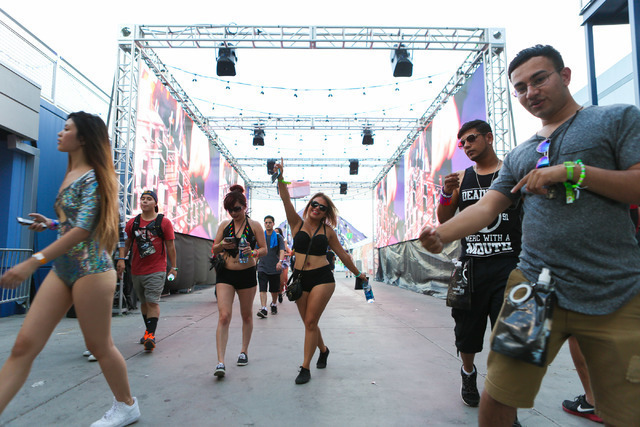Fashion goes minimal at EDC

Every Electric Daisy Carnival has its own look and feel — gossamer wings were all the rage one year, colored furry boots the next. This year, however, many women sported a decidedly minimal look. As in barely there, nearly nude or somewhere in between. Pasties were popular, often little more than duct tape fashioned into an X just large enough to cover the areola. Some sported thongs for a cheeky look, others opted for spandex bottoms so short they would make Daisy Duke blush.
Four years in, Allison, 26, Taylor, 24, and Emily, 22, used to make brightly hued homemade outfits, but for their fourth EDC, the trio from Northern California opted to wear all-black micro-ensembles complemented with matching navy lipstick and winged eyeliner.
“It’s just kind of a different environment where you’re able to let go and kind of just wear whatever you want,” said Emily, who like the other two women declined to give their last names. “It doesn’t really have to be about being naked, but it happens, it’s kind of the style.”
It’s also practical, she pointed out on Sunday night, the final leg of the three-day music fest, which, on a 100-degree Las Vegas night, meant choosing comfort over elaborate costuming. For this group, that translated to black-tape pasties, leather bralettes, strappy bathing suit tops and short shorts with skin-baring side cut outs.
Low-cut bottoms, one piece jewel-tone bathing suits and decked-out bras have become just as much a part of the rave fashion for women as the kandi bracelets made from pony beads that stack attendees’ arms.
That’s not to say some men weren’t wearing Speedo-sized bottoms or smaller — they certainly were — but the predominant dress code for male attendees seemed to be shorts and either a tank top or no shirt. It’s the female attendees who, within the festival gates, embrace a stripped-down festival persona, regardless of their real-world identities.
“Before, you’re like, ‘Oh my god, I’m so naked, I feel so uncomfortable,’ but then once you’re here, you’re just free,” Allison says. “I don’t feel like that in any other area of life, you know? Like, I’m pretty conservative.”
Sam Nispel, a 21-year-old from Phoenix, didn’t hesitate about baring it all; one day she wore a black and purple tutu and bra she had affixed with rhinestones, flowers and a bow. The next, she chose a gold bikini, spandex shorts and neon blue fishnet tights. The gates at EDC represent a literal and metaphorical partition between two universes — rave and real — that she inhabits.
“It’s a completely different environment than being outside in the outside world,” Nispel says. “I go to work, and I have to wear business attire, and so coming here, nobody judges you. You feel a little bit more comfortable.”
The EDC environment and culture make the clothing-minimal dress code possible. Throughout the festival, people throw out the words unity, love and respect again and again, not just when talking about standards of dress. What they’re implicitly referring to is PLUR, or peace, love, unity, respect, the central philosophy at EDC and of rave culture as a whole.
“Back in the day, PLUR used to be huge, like, if people saw you making fun of somebody, they would get your ass, it was unacceptable at the raves, like, parking lot’s a little different, but when you’re inside, everybody loves everybody,” Medlock said. “Slowly, as it’s come further and further down the line, with the drugs and stuff, maybe it’s a little more difficult, but with big events like this it’s still the underlying theme.”
In the darkness, among the crowds and throngs of nearly-naked bodies, it’s hard not to wonder if people take advantage of the environment to justify perpetrating sexual harassment or sexual assault. But the answer was unanimous among those I talked to: No one had experienced or witnessed it, not here. That would be antithetical to PLUR, “and a lot of people do know that,” Emily said.
Men note the lack of clothing, sure, but repeatedly insisted it’s not nearly the most thrilling part of the weekend next to the other sights and sounds.
Even people on the outskirts of the Electric Daisy Carnival — namely, the security staff — miss the respect that makes up one-quarter of PLUR, the three women say. Entering the festival Sunday, one security guard yelled, “BOOBS!” at Allison as she walked by. Other times, security staff have clearly taken videos or photos of the women.
“They don’t know, they’re not part of it,” Taylor said.
And, Taylor, Allison and Emily all agree: Some nightclubs they have been to are much worse.
Sure, the culture has shifted as rave culture becomes more mainstream — the three women say people focus much more on their appearance and style than before; Medlock says drug use has become more prevalent — but overall, festival-goers remain open-minded and accepting.
“No one judges you,” Nispel said, adding that that sentiment extends to whatever people choose to put on or take off. “Your body is a canvas, it’s meant to be looked at, it’s meant to be observed.”
Contact Sarah Corsa at scorsa@reviewjournal.com or 702-383-0353. Find @sarahcorsa on Twitter.